🛠 Creating an Idea Development System
May 25, 2020 • 9 min • Writing
Ideas are at the root of everything we do. They form our view of the world, who we are, and the actions we take. Some say that ideas don't matter and that only execution does. I disagree. You can only get so good at execution. Great ideas give you much more leverage.
That said, the underlying assertion that standalone ideas aren't valuable has some truth to it. Interesting outcomes come from combining ideas together and digging below surface-level assumptions. If you want to get the most out of your ideas, extra effort is required.
I like to refer to this extra effort as the "idea development" process. If you're a somewhat curious person then you're already doing this to some degree. In my case, sometimes I would take the time to further develop my ideas. Other times I would just collect them and move on. As James Clear would put it, I needed a system:
Goals can provide direction and even push you forward in the short-term, but eventually a well-designed system will always win. Having a system is what matters. Committing to the process is what makes the difference.
This post lays out my process for going from idea to blog post. Note that I'll focus on writing as my medium of choice for developing and sharing ideas. There are plenty of other ways to achieve this, but all the principles here should still apply. What matters is that you are taking ideas a step further and putting something out into the world.
Draw Inspiration from Others
All ideas are combinations of other ideas. If you want to have better ideas, have more ideas in general. I like to think of as like an inventor trying to build a machine. If they have a handful of parts, they won't get far. If they have thousands of parts to draw from, then the possibilities are endless.
If you haven't checked out Where Good Ideas Come From from Steven Johnson, the book does a good job of further explaining this point:
Good ideas are not conjured out of thin air; they are built out of a collection of existing parts, the composition of which expands over time. The trick to having good ideas is not to sit around in glorious isolation and try to think big thoughts. The trick is to get more parts on the table.
When it comes to creativity, more input equals more output. I have more ideas when I'm doing more reading, listening to podcasts, doing online courses, you get the picture. The list goes on.
The form factor doesn't matter as much as the quality and quantity of the input. If you ingest a bunch of noisy content then you'll end up wasting your time and not getting anything done. Ideally, you want a good signal to noise ratio. More inspiration is good, but spend too much time on this step and you won't end up shipping anything.
If you want to improve your signal to noise ratio, stop searching for content. Lean on trusted curators to bring forward high-quality links. For me, this looks like a bunch of newsletters. There's still some light curation in the emails themselves, but this will get you 90% of the way there.
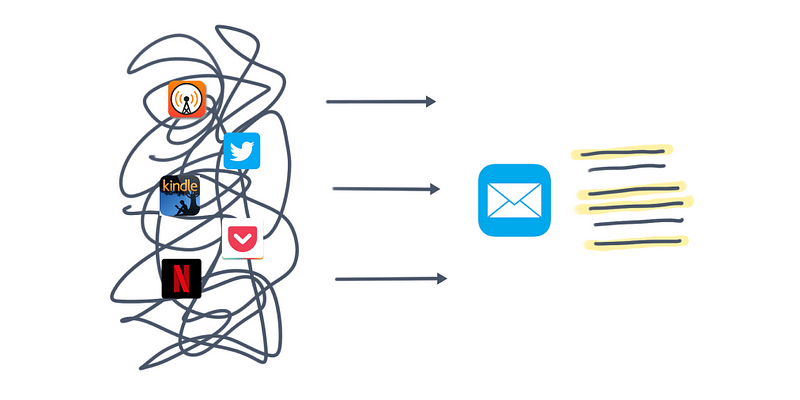
Organize Your Ideas
When you're reading or listening to content, the hope is that something interesting will pop out at you. Similarly, you'll think of things throughout the day that are worth writing down. When this happens, don't wait around. Document the idea in a centralized place before you forget.
I've been doing this for a while now and have thousands of notes saves in a folder called "Ideas" that I hold onto dearly. For a long time, I was doing this in Evernote but I recently made the switch to Notion. There are other fancy tools like Roam Research that I want to look into at some point, but my system is simple enough that I just defer to the user experience that I prefer. Functionally, it's all the same.
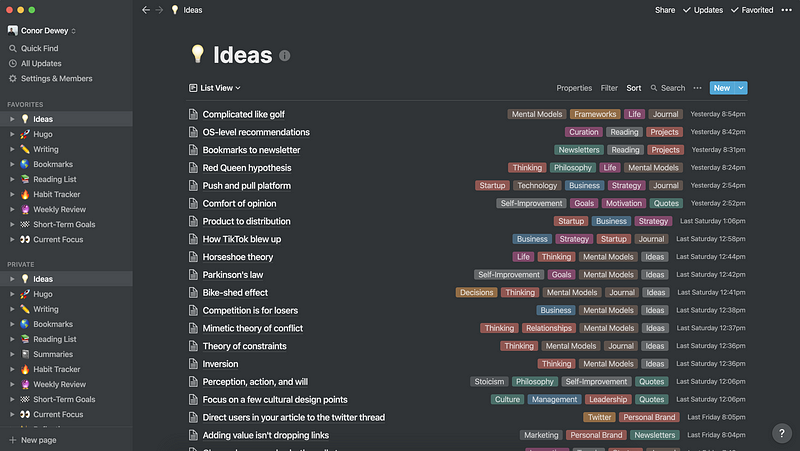
As you can see above, there's nothing crazy going on here. Whenever I find something interesting to me, I open up a new note and drop it in this folder. I assign tags based on the "type" of idea and what it relates to. There are a handful of main types that I have tags for:
- Projects are ideas that I want to work on. These are generally business ideas or tools that I want to build.
- Journal are ideas that I would write about. If I feel like there's enough brewing that I could write a couple hundred words about it, then it falls in here.
- Quotes are exactly what they sound like, normally these are book quotes or passages that I stumble upon while reading online.
- Ideas are sort of a catch-all tag. Anything that doesn't fall in the prior categories might be grouped in here.
As a goal for each day, I aim for a minimum of 3 Project and 3 Journal notes. If I spend time ingesting content, then I'll hit these goals most of the time.
This wasn't always the case. I've experimented with lots of different goals here over the years. What I've taken away from it is that you can train yourself to have more ideas. At first, you won't come up with 3 ideas for each. Next, you'll come up with enough ideas, but you won't like all of them. Quantity comes first and quality comes later.
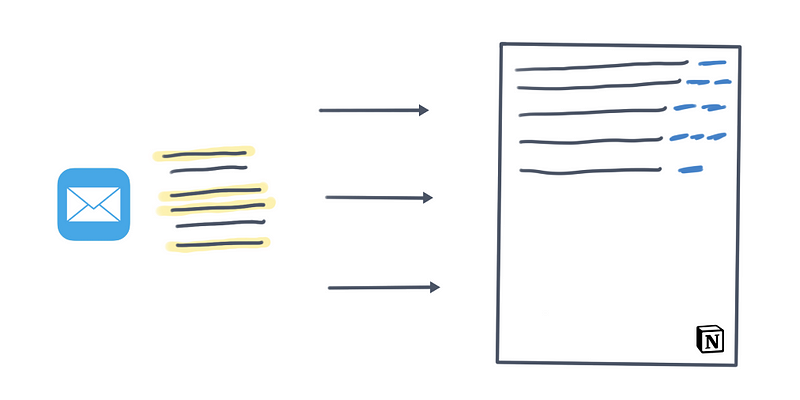
Filter and Elaborate
To this point, we have gone over building out a commonplace book to serve as your personal knowledge base. Once you have ideas organized in the tool of your choice, it's time to filter through them and put something out into the world.
Each night I go through my ideas from that day. While I do that, I'm looking for the ones that I'd like to elaborate on. Often these already have a Journal tag, but sometimes I see things differently the second time through. The output here is one of two things: Either I expand on the idea and end up with a couple stream-of-consciousness paragraphs or I condense the idea down to something easier to digest.
Regardless of which way things go, I hold myself to a deliverable of a tweet. It could be a full-blown thread, sharing a relevant image, or just a sentence or two. While Twitter is my social media of choice, you could always do this somewhere else. There are a lot of benefits to sharing:
- Forces you to refine the idea enough for others to understand it
- Provides others with a valuable look into your process
- Gives people the chance to provide you with feedback and related resources
In the best case scenario, others will respond to your post and help you further develop the idea. Even if nobody responds, it's still a great forcing function for moving faster and getting your thoughts into the world. Sharing anything is almost always better than sharing nothing.
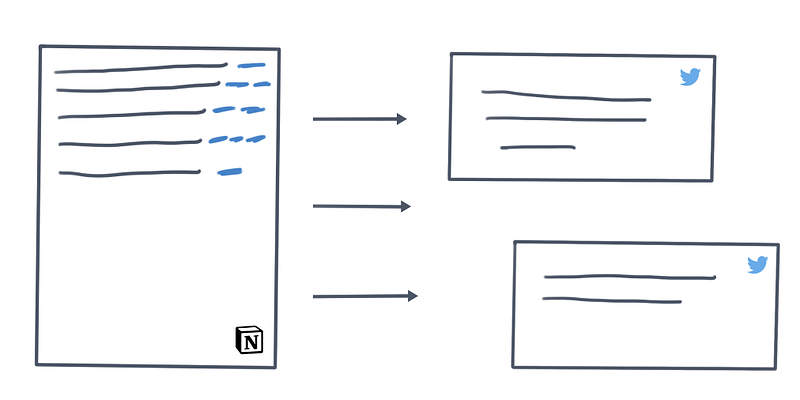
Refine Your Thinking
Your idea could live out its life as a tweet, but if you think there's still more to explore, write a blog post! It doesn't have to be beautifully written. It doesn't have to take a super long time to write.
I have to block off time in the morning to write each day or it doesn't get done. I put my phone in another room and just sit there with a text editor open. If you show up every day, you eventually get bored and have no choice but to start producing results.
I recommend separating the revision and creation process in some way. I've been experimenting with alternating writing and editing days lately. I spend the first day brain dumping all of my thoughts and the next day I review what I've written and try to make it understandable.
Last but not least, pictures are a good thing. I'm a bit of a hypocrite here since my posts aren't especially image-dense, but as you can tell, I'm working on it! Your brain is forced to work differently when you task yourself with translating ideas to images. You'll better understand the idea that you're exploring, and others will too. Visualizations often communicate your ideas more clearly than words ever could.
If you're getting started here, I recommend checking out Figma. There's plenty of YouTube tutorials, and besides, it's free for personal use.
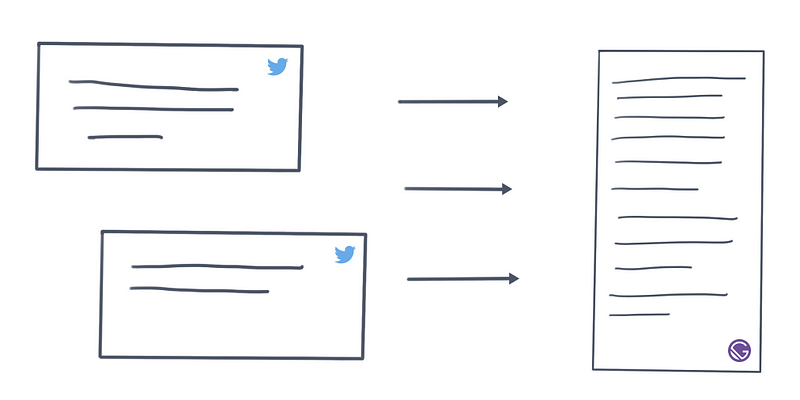
Share Your Work
For similar reasons to the ones we outlined earlier, you should make your output publicly available. It's good for your idea development process, and someone else might find it valuable. Besides, it's gratifying when others appreciate your ideas.
There are lots of ways to achieve this. If you have a personal website, you can publish it there or you can use a platform like Medium. I publish new blog posts on my website first. Once I've done that, I do my best to distribute the idea in other places.
I start with Twitter, sharing the link in a thread with a short summary. Then I'll share my posts on LinkedIn in a similar fashion. Sometimes I'll repost to Medium, but I've found that to be a less successful avenue for me.
There are also the forum sites like Reddit that seem to be effective for this. You can repurpose your blog post to meet the standard format of the platform, then share it there to get more eyes on your idea.
Last but not least, I send out a weekly newsletter with links to the content that I find interesting, along with anything I wrote recently.

Follow up and Reflection
One of the benefits of distribution is that you get additional feedback and ideas out of the process. If you get any responses, reply to all of them! I'm more introverted so this is difficult for me sometimes, but it's really helpful and encouraging to get a dialogue going on afterwards.
Other than engaging with others, I haven't figured out a great way to engrain this reflection in the idea development process. I think I'm getting closer though. This was a big part of the motivation behind creating a podcast where I dig deeper on previous ideas. I'm still assessing how effective this is, but I'm optimistic right now.
As I mentioned earlier, if you don't get any responses, that's okay too! You still walk away with a more solidified mental model of whatever you wrote about. That's why this process is so great. It isn't just another project that you work on. It's a foundational behavior that supports everything else.

Wrapping up
Setting up and following through on a system like this may seem time consuming, and it can be, but this is how I learn things. If learning isn't worth dedicating some extra time to, then what is?
Here's another look at my idea development system:
- Consume high-quality content
- Take notes and collect ideas
- Organize and filter ideas
- Flesh out ideas in a small, public deliverable
- Expand thinking into a blog post
- Distribute the blog post on platforms
- Engage in discussion afterwards
I'm sure I'll continue to iterate on this process. It's changed quite a bit over the years, but I'm pretty happy with where it's at right now. For me, writing is learning. I don't see that changing anytime soon.
Thanks for reading! If you enjoyed this post and you’re feeling generous, perhaps like or retweet the thread on Twitter. You can also subscribe in the form below to get future posts straight to your inbox. 🔥